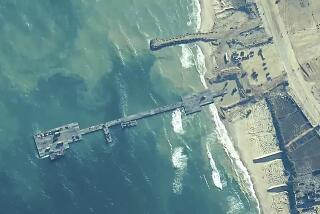Guardsmen Depart for ‘Air Bridge’ in Germany : Military: The Channel Islands unit will transport supplies, equipment and personnel across Europe and possibly to the Middle East, an official says.
- Share via
Three cargo planes carrying 71 volunteer flight-crew members and aircraft mechanics departed for Germany from the Channel Islands Air National Guard Base on Thursday to become part of an “air bridge” to U.S. troops in the Persian Gulf.
The three C-130 Hercules cargo planes will meet a fourth plane from the Oxnard base at the Rhein-Main Air Base near Frankfurt. For now, the four cargo planes and 93 crew members will be based in Germany, transporting supplies, equipment and personnel across Europe and possibly to the Middle East, a spokesman said.
In recent months, the Channel Islands guard unit has dispatched about 50 cargo handlers and medical technicians to Saudi Arabia. But this week marked the first time that the National Guard base has sent some flight-crew and cargo planes overseas to help with the buildup of troops and weaponry in Saudi Arabia.
So far, reservists bound for overseas have been volunteers. But officials said they probably will be asked to activate at least some of the 1,400 reservists to help meet the call-up of an additional 72,500 National Guard and reserve troops authorized this week by Defense Secretary Dick Cheney.
In another development, Navy Cmdr. Charles Kubic said the 600-man Naval Mobile Construction Battalion 3, the only Seabee battalion remaining at Port Hueneme, probably will join the base’s three other Seabee battalions in Saudi Arabia in March. Battalion 3 has been stationed at Port Hueneme since August, after seven months in Rota, Spain.
“We don’t have specific orders yet, but it doesn’t take a genius to figure out where we are going,” said Kubic, the battalion’s commander. “We’re training for Saudi Arabia.”
Under the Seabees’ normal seven-month rotation schedule, the March deployment of Battalion 3 would allow the 600 Seabees in Battalion 40 to return to Port Hueneme. “With world events as they are, who can predict what will happen?” Kubic asked.
At the Air National Guard base Thursday, the volunteer flight crews and mechanics arrived before dawn to prepare for the initial nine-hour leg of their flight to Europe.
The volunteers were issued new identification cards and made sure that their military paychecks would be electronically deposited into checking accounts.
For some of the citizen-soldiers, it was an emotional parting from family members worried about war erupting in the Persian Gulf.
“I just thought he was going to Germany, but he’s not,” said Leslie Zuniga, wife of Sgt. Jerry Zuniga, an airplane mechanic. “He is going to fly back and forth to Saudi Arabia. He won’t be fighting; he’ll be carrying supplies. You wonder if they’ll want to knock out the supply planes.”
Jerry Zuniga tried to comfort his wife as he worked his way through the processing line with his son, Andrew, 7, seated on his shoulders. “She’s not used to this,” Zuniga said. “This is the first time I’ve deployed since I’ve been married.”
Zuniga predicted that he would be home before Christmas. “Of course, if someone pulls a trigger, we’ll be over there a year.”
Clutching a double-handful of junk food for the long flight, Sgt. Angela Bateman said she had not realized the personal risk of flying into a potential war zone.
“Logically, I know this could be something serious, but emotionally it hasn’t sunk in yet,” said Bateman, a Camarillo resident. “We all have a lot of mixed emotions.”
Before departure, many of the 146th Tactical Airlift Wing members joked around on the Tarmac. There was a mixture of excitement about the adventure and a gallows humor about making it home alive. “It is something that you can’t help but think about,” Sgt. Robert Bonino of Ventura said.
“I’m not as excited as some of the younger guys,” said Tech. Sgt. Ray C. Perkins of Simi Valley. “I’ve been to Vietnam, so I know what war is all about. I’ve been to hot spots before.”
Before departure, each reservist went through last-minute briefing on how to handle live bombs, missiles or other ordnance, including chemical weapons.
“If it is a real low charge, it is probably a chemical agent,” warned Capt. Rick Gibson, the mission’s operations officer who led the briefing.
Gibson instructed all the reservists to make sure that they replace the training filters in their gas masks with new filters to be issued before they enter Saudi Arabia. “I don’t have to stress how important this is before going ‘in country,’ ” Gibson said.
More to Read
Sign up for Essential California
The most important California stories and recommendations in your inbox every morning.
You may occasionally receive promotional content from the Los Angeles Times.













